King Juan Carlos I of Spain
Juan Carlos I was King of Spain for 39 years in the late 20th Century and early 21st Century. He was born on Jan. 5, 1938, in Rome. His grandfather was the former king, Alfonso XIII, who had fled the country in 1931; his father was that king's son, Don Juan; and his mother was María Mercedes. When he was 9, young Juan Carlos traveled to Spain to continue his education. He studied in San Sebastian and in Madrid, at the San Isidro Institute. In 1955, he enrolled in the Royal Military Academy; after graduating two years later, he went to the navy and air force schools as well, becoming the first Spanish officer to be a lieutenant in all three military branches. 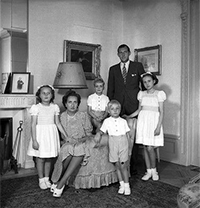
Juan Carlos had an older sister, Pilar, and a younger sister, Margarita. He also had a younger brother, Alfonso. The family suffered tragedy in 1956, when Alfonso died in a gun accident at the family home. Alfonso was 14; Juan Carlos was 18. The future king wanted to study non-military matters as well and so added to his studies at the University of Madrid. In 1960 and 1961, he studied economics, law, and public finance. 
In 1962, Juan Carlos married Princess Sophía of Greece and Denmark. They were married in Athens. They had three children: Elena, Cristina, and Felipe. For all of this time, the ruler in Spain was Francisco Franco, the dictator who had guided Nationalist forces to victory in the Civil War in the late 1930s. Franco ruled by decree, even though the country had a parliament-equivalent Cortes. Franco had announced in 1947 the establishment of a monarchy but had not named the monarch; instead, he named himself regent for life. As the 1960s progressed, he gave serious consideration to a The new heir apparent was at the dictator's side in many settings during the next few years. Juan Carlos took over as head of state when Franco became ill, on July 19, 1974. Franco recovered and ruled for another year, during which he battled a number of illnesses. He died on Nov. 20, 1975, after a month in a coma. Two days later, the Cortes proclaimed the ascension of King Juan Carlos I. 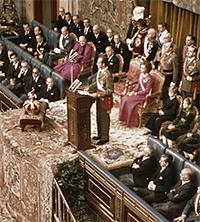
The new king initially professed a desire to continue Franco's policies but gradually introduced reforms and more liberal policies. In 1976, he became the first reigning Spanish monarch to visit the United States, meeting with then-President Gerald Ford. The following year, Juan Carlos called for elections that were the first democratic polling in more than 40 years. The final step in the king's transformation came in the form of the Constitution of 1978, which made Juan Carlos a constitutional monarch who functions as head of state but share powers with a prime-minister-led legislature and an independent judiciary. 
Much of the country appreciated the return to a more democratic, representative government, but many allies of Franco were still in positions of power. On Feb. 23, 1981, Lt. Col. Antonio Tejero and 200 members of the Guardia Civil (Civil Guard), which Franco had instituted as a national police force, marched into the Congress of Deputies and announced that they were taking power in the name of the king. The soldiers, who had told supporters that they had the support of Juan Carlos, kept the members of government hostage for 18 hours while waiting for the king to embrace the coup. The king had other ideas, giving a nationally televised address in which he denounced the coup, saying that he had no part in it and expressing his strong support for the new form of government that he The following year, elections resulted in the ascendancy of the Socialist party PSOE, led by Prime Minister Felipe González. In power for 14 years, the PSOE brought in many laws that broadened individual and collective freedoms. As well, Spain at this time joined the European Economic Community (later the European Union). In 2000, elections resulted in the ascendancy of the more center-right-wing People's Party and a new prime minister, José Mariá Aznar. This was the government that supported Western efforts in the Iraq War, even to the extent of sending troops to aid the U.S.-led invasion. In 2004, a number of explosions aboard commuter trains in Madrid killed nearly 200 people and injured 2,000. It was the highest death toll for a terrorist attack in Spain ever. A video of someone from the militant group al-Qaeda initially claimed responsibility for the attack, and early indications were that the bombings were a response to Spain's taking part in the Iraq War. Subsequent investigations found no direct link between al-Qaeda and the bombings. (The government originally claimed some link to the Basque separatist group ETA.) The 29 people who were eventually tried for crimes relating to the bombings were found to be members of extremist cells within Spain. The king attended the memorial service, as did many other heads of state and high-ranking officials from other countries. As his reign progressed, the king played less of a part in the daily goings-on of government, leaving things more and more to the Cortes and the prime minister. He remained commander-in-chief of the armed forces and kept up state visits, in Spain and in other countries. 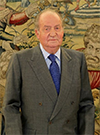
In 2012, Juan Carlos underwent hip surgeries to repair damage he sustained in a fall in Botswana. He sustained the fall on a hunting trip, after which the World Wildlife Fund removed him as its honorary president; he later apologized for taking part in the hunting trip. He required another surgery the following year. He and his family were involved in a few scandals in the next couple of years, and the king no longer had a favorable public opinion. On June 2, 2014, Juan Carlos announced that he was abdicating and that his son, Prince Felipe, would succeed him, as King Felipe VI. Juan Carlos continued to perform the rare public duty as a king emeritus but then retired from public life entirely in 2019. He played some part in securing funding for a high-speed railway in Saudi Arabia in 2020. Investigations into payments associated with that railway deal led the king to leave Spain for good. He settled in Abu Dhabi. |
|
Social Studies for Kids
copyright 2002–2026
David White



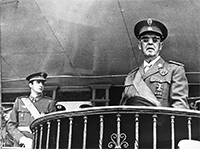 successor. A dedicated monarchist, Franco wanted to see another king as the next ruler. He knew that the heir apparent was Don Juan but, fearing that he would try to undo many of Franco's accomplishments, named as his successor Don Juan's son, Juan Carlos, who later publicly embraced the dictator and his policies. Franco made the announcement in 1969, naming Juan Carlos Prince of Spain.
successor. A dedicated monarchist, Franco wanted to see another king as the next ruler. He knew that the heir apparent was Don Juan but, fearing that he would try to undo many of Franco's accomplishments, named as his successor Don Juan's son, Juan Carlos, who later publicly embraced the dictator and his policies. Franco made the announcement in 1969, naming Juan Carlos Prince of Spain.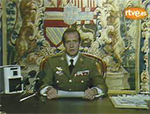 helped bring in a few years earlier. In part, he said, "The Crown, symbol of the permanence and unity of the nation, will not tolerate, in any degree whatsoever, the actions or behavior of anyone attempting, through use of force, to interrupt the democratic process of the Constitution, which the Spanish People approved by vote in referendum." The soldiers in the congressional hall then released all of their hostages and gave up their arms. The trials that followed convicted several dozen of the coup leaders. A reminder of the coup is a number of bullet holes in the parliament building ceiling: Some soldiers fired their guns during the ordeal, but no one was killed.
helped bring in a few years earlier. In part, he said, "The Crown, symbol of the permanence and unity of the nation, will not tolerate, in any degree whatsoever, the actions or behavior of anyone attempting, through use of force, to interrupt the democratic process of the Constitution, which the Spanish People approved by vote in referendum." The soldiers in the congressional hall then released all of their hostages and gave up their arms. The trials that followed convicted several dozen of the coup leaders. A reminder of the coup is a number of bullet holes in the parliament building ceiling: Some soldiers fired their guns during the ordeal, but no one was killed.
